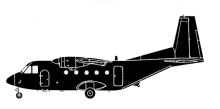
ASN Wikibase Occurrence # 326120
| Date: | Monday 15 January 1990 |
| Time: | 08:29 |
| Type: |  CASA C-212 Aviocar 200 |
| Owner/operator: | Servicios Aéreos Nacionales - SANSA |
| Registration: | TI-SAB |
| MSN: | 163 |
| Year of manufacture: | 1980 |
| Total airframe hrs: | 3589 hours |
| Cycles: | 7217 flights |
| Engine model: | Garrett TPE331-10-511C |
| Fatalities: | Fatalities: 23 / Occupants: 23 |
| Aircraft damage: | Destroyed, written off |
| Category: | Accident |
| Location: | 16 km SSE of San José-Juan Santamaria International Airport (SJO) -
 Costa Rica Costa Rica
|
| Phase: | En route |
| Nature: | Passenger - Scheduled |
| Departure airport: | San José-Juan Santamaria International Airport (SJO/MROC) |
| Palmar Sur Airport (PMZ/MRPM) | |
| Investigating agency: | DGAC Costa Rica |
| Confidence Rating: |
A CASA C-212 Aviocar was destroyed when it flew into the side of a mountain at an elevation of 2200 m while on a domestic Costa Rican flight from San José-Juan Santamaria International Airport (SJO) to Palmar Sur Airport (PMZ). All three crew members and twenty passengers were killed in the accident.
SANSA Flight 32 received clearance for a runway 07 departure at 08:23. The controller reported winds from 100 degrees at 30 knots and cleared the flight to climb to 5500 feet after takeoff. The CASA took off at 08:25 and climbed towards a mountainous area, shrouded by clouds. Immediately after takeoff the crew received clearance to climb to 8500 feet. The airplane continued to climb but flew into the side of a wooded mountainside at an elevation of 2200 m (7200 feet).
PROBABLE CAUSE: "The Investigating Commission determined that the probable cause of the accident was the failure to comply with the flight plan initially proposed to Air Traffic Control and to continue flying on a course that would lead the aircraft to enter IMC conditions, while flying under VFR flight rules; without having foreseen the minimum safety standards for the conditions prevailing in the place where the flight was conducted. This action could have been influenced by fatigue and lack of motivation.
Contributing to the accident was the deficient operations management and the lack of a flight safety program on the part of the operator".
Accident investigation:
 |
|
Sources:
ICAO Circular 263-AN/157 (1-46)
Location
Revision history:
| Date/time | Contributor | Updates |
|---|
The Aviation Safety Network is an exclusive service provided by:


 ©2024 Flight Safety Foundation
©2024 Flight Safety Foundation